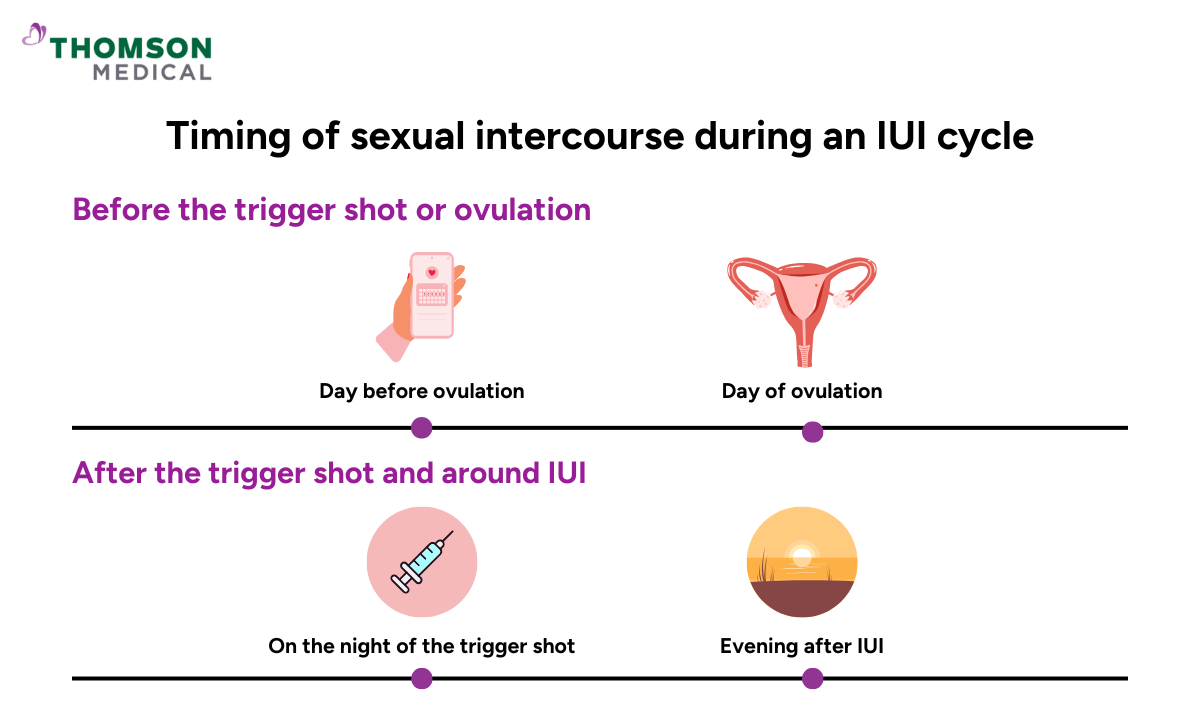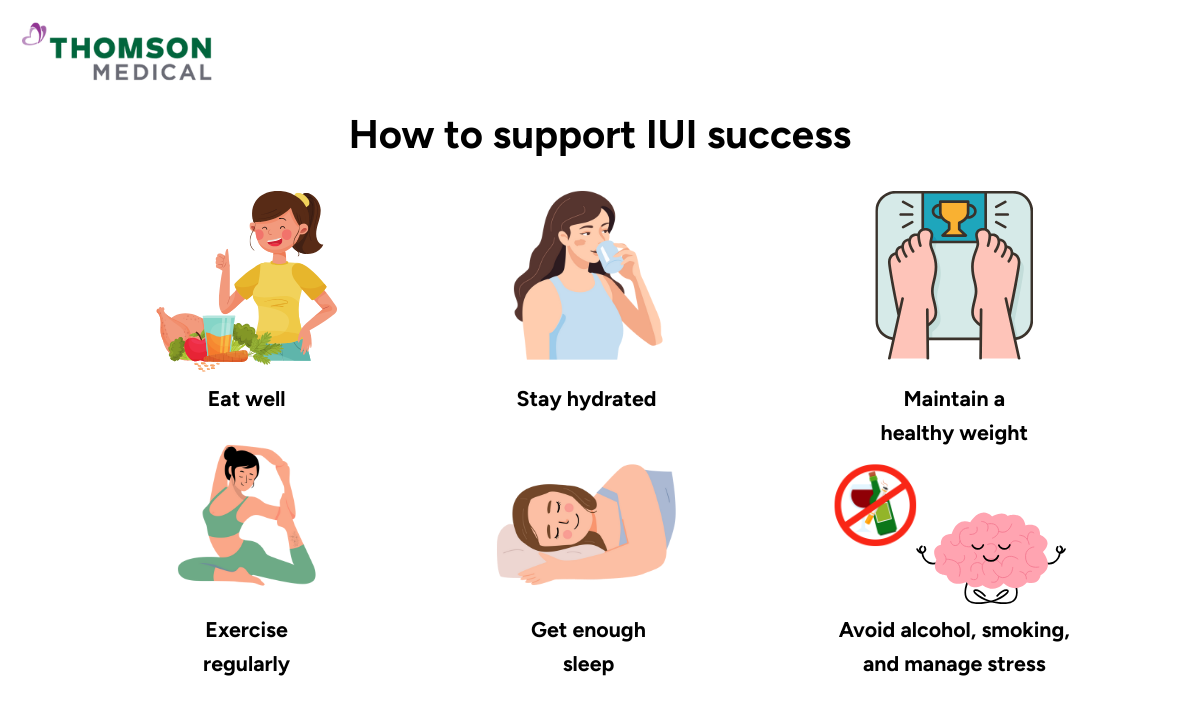While intimacy plays a key role in conception, proper guidance and the timing of intercourse are also important, especially during fertility treatments. If you’re preparing for an IUI procedure, you might be wondering if it’s okay to have sex beforehand. Here’s what you need to know to make informed choices that support your chances of success.
Can you have sex before an IUI procedure?
While it may feel natural to remain intimate during your intrauterine insemination (IUI) cycle, it’s generally advised to avoid sexual intercourse for about 2 to 5 days before the sperm collection procedure. This brief abstinence period isn’t about restricting intimacy throughout the entire IUI cycle but about optimising your partner’s sperm quality.
By allowing time for sperm count and motility to recover, the sample used for the IUI (usually collected on the same day as the procedure) will be as strong and healthy as possible. A high-quality sperm sample increases the effectiveness of the sperm injection into the uterus, giving it the best possible chance for fertilisation and pregnancy during fertility treatment.
Timing of sexual intercourse during an IUI cycle

Understanding when to have sex during your IUI cycle can improve your chances of conception. This is because timing is crucial, especially around ovulation and after the trigger shot.
Before the trigger shot or ovulation
The most fertile window is the day before and the day of ovulation. While an egg remains viable for about 12 to 24 hours after it’s released, sperm can survive in the female reproductive tract for up to five days. This means having sex in the days leading up to ovulation, especially on the day itself, can significantly increase your chances of getting pregnant.
In an IUI cycle, ovulation is often triggered using a human chorionic gonadotropin (hCG) hormone injection, which helps the egg mature and initiates ovulation. Ovulation typically occurs 24 to 48 hours after the trigger shot, and many fertility specialists recommend having intercourse at home on the day of the injection to ensure that sperm are already present in the fallopian tubes when the egg is released.
After the trigger shot and around IUI
Sex is also recommended on the night of the trigger shot and again in the evening after the IUI procedure. Since IUI is usually scheduled around 36 hours after the hCG injection, timed intercourse around this window ensures that sperm are already in the reproductive tract, particularly in the fallopian tubes, when ovulation occurs.
Having another round of intercourse after the IUI can help maximise sperm availability and potentially improve success rates.
Are you ready to take the next step in your fertility journey? Request an appointment with Thomson Fertility Centre today.
Our IUI specialist
Loading...
How to support IUI success

Improving your chances of success with IUI goes beyond just timing, it also involves taking care of your overall health and well-being. A balanced lifestyle and effective stress management play key roles in enhancing fertility outcomes.
Here are some tips you can follow to support IUI success, such as:
Eat a nutrient-rich diet:
Focus on foods high in protein, antioxidants, omega-3 fatty acids, and essential vitamins to support reproductive health.
Stay hydrated:
Aim to drink 2 to 3 litres of water per day to keep your body functioning optimally.
Maintain a healthy weight:
Keeping your BMI within the normal range can help regulate hormones and improve fertility.
Exercise regularly:
Gentle, moderate-intensity activities like brisk walking or swimming are beneficial for hormone balance and overall health.
Prioritise sleep:
Aim for 7 to 9 hours of quality sleep each night to support your body’s natural reproductive functions.
Avoid alcohol and smoking:
Both habits have been shown to lower fertility and reduce the success rate of IUI procedures.
Manage stress effectively:
Techniques such as meditation, deep breathing, and maintaining a positive mindset can help support hormonal balance and emotional well-being during treatment.
To help you achieve your fertility goals and maintain your conception chance after IUI, request an appointment with Thomson Medical. Our fertility specialist can help by providing you tailored lifestyle choices that support your fertility journey.
FAQ
Is it better to abstain from sex before IUI?
Yes, but the key reason is to improve sperm quality, not to avoid intimacy altogether. The recommendation for your partner to abstain from ejaculation for 2 to 5 days before the procedure is aimed at boosting sperm concentration and motility for the sample used during IUI. It's a short-term strategy to optimise your chances of conception.
What should you avoid before an IUI procedure?
To support a successful IUI, here are key things to avoid:
- No ejaculation for 2–5 days before IUI
- Avoid high stress
- Skip strenuous exercise
- Avoid smoking and alcohol
- Stay away from hot baths, saunas, and hot tubs
- Limit caffeine intake
How can you increase your chances of IUI success?
Here are some tips to help improve your chances of conceiving following an IUI procedure:
- Eat a balanced diet rich in protein, antioxidants, omega-3s, and vitamins
- Drink 2–3 litres of water daily to stay hydrated
- Maintain a healthy BMI to support fertility
- Do moderate exercise like brisk walking or swimming
- Get 7–9 hours of quality sleep each night
- Avoid smoking and alcohol, as they can lower success rates
Does having sex before IUI affect success rates?
Yes, it can. If your partner ejaculates too close to the IUI procedure. Ejaculation within 2–5 days before sperm collection may reduce sperm count and motility, which could lower the chances of success. Following the recommended abstinence period helps ensure a stronger, healthier sperm sample for the best possible outcome.
Can IUI be successful on the first try?
Yes, IUI can be successful on the first attempt, but it varies for each couple. While some achieve pregnancy on their first cycle, it’s more common to conceive after 3 to 4 attempts. Success rates tend to improve slightly over multiple cycles, depending on factors like age, fertility health, and timing.
How long can sperm sit before IUI?
Once collected, sperm is typically processed and used for IUI within 1 to 2 hours. Fresh sperm should not be left unprocessed for long, as motility and quality can decline over time. If frozen sperm is used, it is thawed and prepared shortly before the procedure to ensure the best chance of success.
Is it possible to use unwashed sperm in IUI?
Technically, unwashed sperm can be used in IUI, but it is not recommended. Unwashed semen contains proteins and other components that may trigger uterine cramping, inflammation, or immune reactions, as the body may treat it as a foreign substance.
To ensure safety and improve the chances of conception, sperm washing is routinely performed before IUI. This lab process separates motile (active) sperm from seminal fluid, dead sperm, and debris, which results in a clean, concentrated sample. The washed sperm is then inserted directly into the uterus using a thin catheter, increasing the likelihood of successful fertilisation.
Do I need to avoid pregnancy tests after IUI?
Yes, it’s best to wait at least 14 days after the IUI before taking a pregnancy test. Testing too early can lead to false positives or false negatives, especially if you’ve had a trigger shot (hCG injection), as the hormone may still be in your system and affect the result.
Your doctor may schedule a blood test (beta-hCG) around two weeks after the procedure for the most accurate confirmation.
If you're considering IUI as a fertility treatment option, request a consultation with our fertility specialists at the Thomson Fertility Centre for personalised recommendations and tailored advice.
